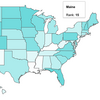Aroostook County initiative touts potential of a 'forest products cluster'
The Aroostook Partnership for Progress, a public-private organization created to spur economic development in Maine's northernmost county, is leading a grassroots effort to advance the forest products sector as a “cluster” with a strong potential for adding good-paying jobs in Aroostook County.
Robert Dorsey, the organization's president and CEO, says a working group of 35 forestry business leaders, educators, bankers and government officials has met four times since December to identify opportunities to expand The County's forest industry, as well as the potential obstacles. The group's next meeting is scheduled for June 3, when Dorsey expects an action plan will be developed to give shape to the idea that diverse Aroostook-based businesses such as 7 Islands Land Co., Ecoshel, ReEnergy Holdings, Louisiana-Pacific Building Products and J.D. Irving Ltd. have common competitive strengths and needs and would benefit from a closer working relationship.
Forest products make up 20% of Maine's $50 billion overall economy. Roughly 39,000 direct and indirect jobs are tied to Maine's forest economy statewide, according to the Maine Forest Products Council's 2013 report. About 7,000 of those jobs are based in Aroostook County.
“It's a big deal, not only for Aroostook County but also for the entire state of Maine,” Dorsey says.
Joseph Cortright, an economist at Portland, Ore.-based Impresa Economics, gives some credence to the effort underway in Aroostook County to identify its forest products sector as a cluster. In a 65-page whitepaper he wrote for The Brookings Institution titled “Making sense of clusters: Regional competitiveness and economic development,” Cortright makes the following points:
• Clusters are the key organizational unit for understanding and improving the performance of regional economies.
• Identifying a cluster matters because it orients economic development policy and practice toward groups of companies and away from individual companies. That's important, he says, because it encourages those groups and local and state government to work together on common problems (such as workforce training), rather than treating those problems as isolated challenges.
• Identifying a cluster's competitive strengths and its needs requires ongoing dialogue between companies and other stakeholders within the cluster.
• Clusters should build on the unique strengths of their regions rather than try to be like other regions. Different regions have different sets of economic development opportunities.
• Cluster policy is not about “picking winners” or excluding industries.
Cortright concludes with this caveat: “Clusters are best viewed as an organizing principle for economic development, a useful framework for building an understanding of a regional economy and undertaking action, rather than as a policy panacea. By itself, clustering does not determine economic success. But a cluster analysis can help diagnose a region's economic challenges and opportunities and identify what a region might do to influence its economic future.”
A supporting voice
“I think the cluster is there already,” says Patrick Strauch, executive director of the Maine Forest Products Council. To back that up, Strauch points to these recent developments that have added jobs and boosted the stability of Aroostook County's forest products industry:
• J.D. Irving Ltd.'s state-of-the-art softwood sawmill in Ashland, a $30 million investment that opened in 2014 featuring biomass boilers, dry kilns and a planer mill. The softwood lumber made at the facility is sold to major retail lumber yards throughout the Eastern seaboard and offers customers a choice of products certified under the Forest Stewardship Council or the Sustainable Forestry Initiative. Wood for the sawmill is procured from the company's woodlands, as well as from other woodlot and timberland owners in Maine.
• ReEnergy Holdings resumed full operations in late 2014 at its biomass-to-electricity facility in Ashland. The 39-megawatt facility, which opened in 1993 and had been idle since March 2011, was acquired by ReEnergy in December 2011 as part of a multi-facility portfolio purchase from Boralex Industries Inc. The facility generates renewable energy from forest residue biomass and is capable of producing 284,000 megawatt hours of electricity each year, enough to supply 37,000 homes.
• Maibec Inc., a Quebec-based family business with a workforce of 700 employees in Canada, completed in late January its purchase of Fraser Timber LLC's lumber mill in Masardis. Maibec President Francois Tardif characterized the purchase at that time as an “important milestone in our growth,” saying it gives Maibec its first place of business in the United States, with “easier access to the U.S. market” and would enable the company to increase its market share. The mill employs approximately 135 people and can produce more than 100 million board feet of softwood lumber annually for the construction and renovation markets.
• Ecoshel, a cedar shingle maker, relocated from Georgia and opened a new mill in Ashland utilizing a new high-tech assembly line developed by the University of Maine's Advanced Manufacturing Center. The new process can produce a shingle every second.
“It's an interesting contrast to what's been happening with our pulp and paper industry,” Strauch says. “It's a very different dynamic [in The County]. Businesses are finding out they have jobs to fill and they need to get qualified people into them. Now we have to build this workforce to meet those needs. Bob's group is a good regional effort to scope out what's needed and create an action plan to build on these opportunities.”
Innovation is driving many of those opportunities in Aroostook County, he adds.
For example, Huber Engineered Woods LLC, which is based in Charlotte, N.C., but has a manufacturing plant in Easton, recently had two products voted No. 1 in their respective categories in Builder magazine's annual brand-use study: AdvanTech flooring, a high-density engineered wood that's moisture-resistant and easy to install; and ZIP System sheathing, a new type of wall sheathing that's designed for maximum energy efficiency.
In another example, he cites Louisiana-Pacific Corp., which invested $140 million in its New Limerick manufacturing plant about seven years ago and is one of the County's largest employers with 130 employees. Louisiana-Pacific makes a high-tech engineered wood product called “laminated strand lumber” at that factory and touts the wood product as a high-value for builders due to its consistency in not being prone to warping, twisting and bowing.
“There's all that going up there as well,” Strauch says.
Goals and objectives
Aroostook Partnership for Progress's Dorsey says the working group already has identified several goals and objectives to support its ultimate goal of growing Aroostook County's forest economy by increasing its value-added processing and manufacturing capabilities and thereby creating new, good-paying jobs.
“Value-added production is where the real money is,” he says. “We need to take a look at the Maine regulatory environment to see if there are jobs we're losing, if there is value we're losing, if there are profits our companies are losing to other states because of regulations we might have that reduce competitiveness.”
Building on Strauch's point that much of the recent investments by forest products companies in Aroostook County are being driven by innovation, Dorsey says the working group has identified workforce training as a top priority to make sure those investments are supported by skilled workers. Part of that effort, he says, involves educating teachers about how much the forest industry has changed in the last 20 to 30 years, and that today's forest-sector jobs require strong skills in science, technology, engineering and mathematics.
“These are $45,000 and $50,000 jobs, they're good jobs, they're raising the overall wage structure of Aroostook County,” he says.
In addition to improving the image and doing a better job of promoting the forest industry, Dorsey says the working group already has identified a need to increase training opportunities for equipment operators, off-road truckers and self-employed contractors who might lack some skills needed to sustain their businesses.
Improving transportation networks, reducing energy costs and creating consistent state economic development policies that support forest product companies' ability to compete effectively in a global economy are some of the other objectives that have been raised, he says.
“What is our growth plan for the next five to 10 years to grow those areas where our strengths are?” Dorsey says. “We're not simply looking at things from a regional perspective either. We're hoping this can be an example of how working together will help grow Maine's economy. We're hoping by having a cluster, we're going to get people thinking a little bit more broadly about what needs to be done to realize our potential.”
Read more












Comments